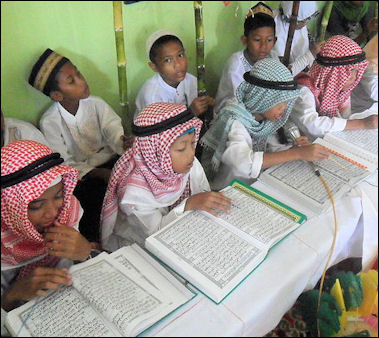Home | Category: Islam and the Qur’an
LEARNING THE QUR'AN
 The Qur’an is not only the most widely read book in the Muslim world it is also the most recited (“Qur’an” means “Recitation” afterall). “”La allah illa allah; Muhammad rasul allah” ,” are the first words whispered into a newborn child's ear and the last word said to man or woman on his or her deathbed. Children in Muslim schools spend most of their time memorizing Qur’anic passages in Arabic, and in many countries it is not unusual to see people pacing back and forth city parks, reciting verses from the Qur’an out loud for hours at a time.μ
The Qur’an is not only the most widely read book in the Muslim world it is also the most recited (“Qur’an” means “Recitation” afterall). “”La allah illa allah; Muhammad rasul allah” ,” are the first words whispered into a newborn child's ear and the last word said to man or woman on his or her deathbed. Children in Muslim schools spend most of their time memorizing Qur’anic passages in Arabic, and in many countries it is not unusual to see people pacing back and forth city parks, reciting verses from the Qur’an out loud for hours at a time.μ
According to the BBC: “At the time of the revelation of the Qur'an, books were not readily available and so it was common for people to learn it by heart. Committing the Qur'an to memory acted as a great aid for its preservation and any person who is able to accomplish this is known as a hafiz. |[Source: BBC]
Reciting the Qur’an is the backbone of Muslim education. The aim of every pious Muslim is to memorize the entire book and recite it during Ramadan, the Muslim month of fasting. All over the world children in Muslim schools — most of them boys — are working hard to commit the Qur’an to memory even if the don't understand all the Arabic words. A person who memorizes the Qur’an earns the respected title of "hafiz” (“one who has the entire scripture off by heart”). Hafiz are greatly respected and greeted with the title Hafiz. They often are called up during Ramadan to do the nightly Qur’an readings during the 30-day fast.
Websites and Resources: Islam IslamOnline islamonline.net ; Institute for Social Policy and Understanding ispu.org; Islam.com islam.com ; Islamic City islamicity.com ; BBC article bbc.co.uk/religion/religions/islam ; University of Southern California Compendium of Muslim Texts web.archive.org ; Encyclopædia Britannica article on Islam britannica.com ; Islam at Project Gutenberg gutenberg.org ; Muslims: PBS Frontline documentary pbs.org frontline
Qur’an (Quran, Koran) and Hadith: Quran translation in English alahazrat.net ; Quran in Easy English, Urdu, Arabic and 70 other languages qurango.com ; Quran.com quran.com ; Al-Quran.info al-quran.info; Quranic Arabic Corpus, shows syntax and morphology for each word corpus.quran.com ; Word for Word English Translation – emuslim.com emuslim.com/Quran ; Digitised Qurans in the Cambridge University Digital Library cudl.lib.cam.ac.uk ; Sunnah.com sunnah.com ; Hadith – search by keyword and by narrator ahadith.co.uk
RECOMMENDED BOOKS:
“The Story of the Qur'an: Its History and Place in Muslim Life” by Ingrid Mattson Amazon.com ;
“The Holy Quran” Arabic Text English Translation (English and Arabic Edition) Leather Bound
Amazon.com ;
“The Qur'an: A New Translation” by M. A. S. Abdel Haleem Amazon.com ;
“The Holy Qur'an with English Translation and Commentary” by Maulana Muhammad Ali Amazon.com ;
“Towards Understanding the Qur'an: English/Arabic Edition (with commentary in English) by Sayyid Abul A'la Mawdudi and Zafar Ishaq Ansari Amazon.com ;
“The Study Quran: A New Translation and Commentary” Amazon.com ;
“The One and the Many: The Early History of the Qur'an” by Francois Deroche and Malcolm DeBevoise Amazon.com ;
“Revelation: The Story Of Muhammad” by Meraj Mohiuddin Amazon.com ;
“The Critical Qur'an: Explained from Key Islamic Commentaries and Contemporary Historical Research” by Robert Spencer Amazon.com ;
“The History of the Qur'anic Text: From Revelation to Compilation, a Comparative Study with the Old and New Testaments” by Muhammad Mustafa al-ʿAzami Amazon.com ;
“The Qur'an - with References to the Bible: A Contemporary Understanding” by David Hungerford and Safi Kaskas Amazon.com ;
“Hadith: Muhammad's Legacy in the Medieval and Modern World” by Jonathan A.C. Brown Amazon.com ;
“Sahih al-Bukhari”: (All Volumes in One Book) English Text Only by Imam Al Bukhari and Muhammad Mohee Uddin Amazon.com
Memorizing the Qur’an
All Muslims memorize at least a portion of the Qurʾan and are familiar enough with the language to understand the meaning and to be able to participate in daily prayers. A Muslim who memorizes the entire Qurʾan is known as a Hafiz, or "Guardian." [Source: Encyclopedia.com]
Reciting Al Quran at Istiqlal Mosque One who boy who had memorized the Qur’an between the age of 7 to 10 told the Washington Post, “It’s easy to memorize; it’s very hard to remember. The Qur’an is nobody’s friend. If you forget the Qur’an, the Qur’an will forget you.” The boy, who had been call on to recite the Qur’an during Ramadan because no adult could be found that could do it, said he had to practice everyday, starting after prayers at 4:30 am and practicing at school when he is not required to be paying attention in class, and studying the Qur’an more after school, with breaks for his five daily prayers and school homework.
Some Muslims recite the whole Qur’an from memory once every seven days. Writing out the entire Qur’an by hand is considered an act of great piety. Many Muslims, including caliphs and sultans, have performed this task. Some of the greatest works of Muslim art are hand illuminated and decorated Qur’ans, sometimes created with the smallest of details. In Iran today, anyone who has memorized the Qur’an automatically gets a university degree.
In the West many young Muslims have memorized passages of the Qur’an, or even the whole thing, without knowing what most of the words mean. The act is comparable for a Catholic leaning part of the Bible in Latin without being able to speak Latin. American kids that memorize the Qur’an are sent off to special boarding schools where they take regular academic classes of three hours a day and study the Qur’an for 8½ hours more. Under this regimen it takes about three years to memorize the Qur’an.
Reciting the Qur’an
It is important to remember that "Quran" means "Recitation". Even today schools that specialize in teaching Quranic memorization can trace the teachers back to these first Muslims who had committed the entire Quran to memory. The Economist said “there is no more common sound in the Muslim world than the sound of Qur’anic recitation.” It has been said that there was no Qur’an there would be no Islam. One madrassah teacher told Foreign Policy magazine the Qur’an is “the word of God that defines the Muslim community. It tells Muslim their mission in life.”
A Qur’an reciter who wants his voice to heard on the radio or from a muezzin of a famous mosque has be deemed worthy of the honor by a committee of religious scholars. Reciters are judged on their execution of a complex system of scales used to recite the Qur’an.
There are two types of Qur’an recitation: 1) “tartil” , a simple form of reading; and 2) “tajwid” , a musical form that "involves intricate melodic and cadential formula and ornaments." There are individual styles. Some famous reciters are also famous secular singers.
Great reciters compete in tournaments that can attract audiences in the hundreds of thousands. The Economist called them “the World Cups of the Islamic world.” CDs by winners become instant bestsellers. Non-Arab children learn to intone Arabic letters in order to “read” the Qur’an without understanding it.
Taraweeh: Reciting the Qur'an During Ramadan

Childhood glory, Happy Ramadan Many Muslims gather at night, usually at a mosque, for the “Taraweeh” prayers in which portions of the Qur’an are recited using a special technique known as “Qirat” — which stresses clear enunciation, appropriate intonation and the use of pauses. The sound of it has been compared the voice of a mother comforting her baby. American Muslim Jareed Akhter wrote in the Chicago Tribune, “I do not understand much of what is being recited. Nonetheless the experience is inspiring. For those who do not understand the language , the Qur’an conveys a tone of grandeur , dignity and gravity.”
Often the entire Qur’an is recited during the month: 30 sections in 30 days, which works out to about three chapter a day (the Qur’an has 114 chapters but the chapters vary a great deal from relatively long to very short). Hassaball wrote: “The nightly congregational prayers are a wonderful experience, in which we get to hear the entire Qur’an recited ever so beautifully...It warms the heart and soul to worship with hundreds of fellow Muslim every night.”
Sometimes the Qur’an is recited from memory in pairs with each person taking turns and the what who is not reading correcting the other as he reads. In the West the Qur’an is often recited in Arabic by Muslims who don’t known what the Arabic words mean. The reciters are often “hafiz”, people who have memorized the Qur’an.
Sunnah on Reading the Qur'an
The Sunnahs are the practices and examples drawn from the Prophet Muhammad's life. Along with the Hadiths they are the most important texts in Islam after the Qur’an. They must adhere to a strict chain of narration that ensures their authenticity, taking into account factors such as the character of people in the chain and continuity in narration. Reports that fail to meet such criteria are disregarded.
The Sunnah reads: “The state of a Muslim who reads the Qur'an is like the orange fruit, whose smell and taste are pleasant; and that of a Muslim who does not read the Qur'an is like a date which hath no smell, but a sweet taste; and the condition of any hypocrite who does not read the Qur'an is like the colocynth which hath no smell, but a bitter taste; and the hypocrite who reads the Qur'an is like the sweet bazil, whose smell is sweet, but taste bitter. Read the Qur'an constantly; I swear by him in the hands of whose might is my life, verily the Qur'an runneth away faster than a camel which is not tied by the leg. [Source: Charles F. Horne, ed., The Sacred Books and Early Literature of the East, (New York: Parke, Austin, & Lipscomb, 1917), Vol. VI: Medieval Arabia, pp. 11-32]
Image Sources: Wikimedia Commons
Text Sources: Internet Islamic History Sourcebook: sourcebooks.fordham.edu “World Religions” edited by Geoffrey Parrinder (Facts on File Publications, New York); “ Arab News, Jeddah; “Islam, a Short History” by Karen Armstrong; “A History of the Arab Peoples” by Albert Hourani (Faber and Faber, 1991); “Encyclopedia of the World Cultures” edited by David Levinson (G.K. Hall & Company, New York, 1994). “Encyclopedia of the World’s Religions” edited by R.C. Zaehner (Barnes & Noble Books, 1959); Metropolitan Museum of Art; National Geographic, BBC, New York Times, Washington Post, Los Angeles Times, Smithsonian magazine, The Guardian, Al Jazeera, Times of London, The New Yorker, Time, Newsweek, Reuters, Associated Press, AFP, Lonely Planet Guides, Library of Congress, Compton’s Encyclopedia and various books and other publications.
Last updated March 2024

